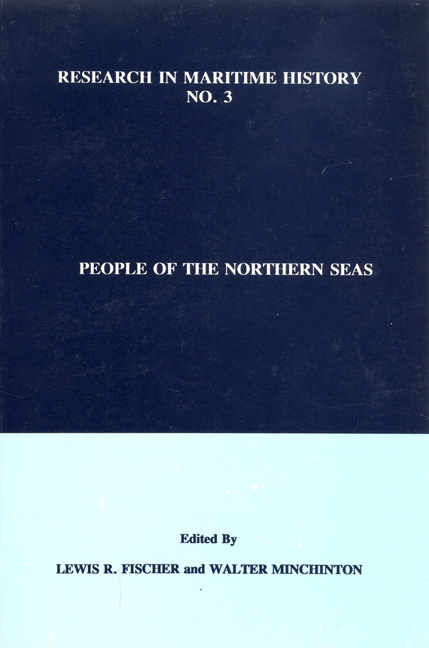Book contents
- Frontmatter
- Contents
- About the Editors
- Contributors
- General Introduction
- “Une Petite Republique” in Southwestern Newfoundland: The Limits of Imperial Authority in a Remote Maritime Environment”
- “Changes in Aleut Communities Following Russian Contact”
- “Five Years Before the Mast: Observations on the Conditions of Maritime Labour in Finland and Elsewhere”
- “Expressions of Longing, Sources of Anxiety? The Significance of Contacts with Home for Finnish Sailors in London and Hull in the Late Nineteenth Century”
- “Death of a Merchant”
- “St. Petersburg's Bills of Exchange in the Russian Economy of the Eighteenth Century”
- “Shipowners and Iron Sailing Ships: The First Twenty Years, 1838-1857”
- “The Growth of Norwegian Shipbroking: The Practices of Fearnley and Eger as a Case Study, 1869-1914”
- “Captain John Deane: Mercenary, Diplomat and Spy”
- “Her Majesty's Coastguard”
- “Coastal Life, ‘Nordic Culture’ and Nation State: Reflections on the Formation of the Nation State and Maritime History”
“Captain John Deane: Mercenary, Diplomat and Spy”
- Frontmatter
- Contents
- About the Editors
- Contributors
- General Introduction
- “Une Petite Republique” in Southwestern Newfoundland: The Limits of Imperial Authority in a Remote Maritime Environment”
- “Changes in Aleut Communities Following Russian Contact”
- “Five Years Before the Mast: Observations on the Conditions of Maritime Labour in Finland and Elsewhere”
- “Expressions of Longing, Sources of Anxiety? The Significance of Contacts with Home for Finnish Sailors in London and Hull in the Late Nineteenth Century”
- “Death of a Merchant”
- “St. Petersburg's Bills of Exchange in the Russian Economy of the Eighteenth Century”
- “Shipowners and Iron Sailing Ships: The First Twenty Years, 1838-1857”
- “The Growth of Norwegian Shipbroking: The Practices of Fearnley and Eger as a Case Study, 1869-1914”
- “Captain John Deane: Mercenary, Diplomat and Spy”
- “Her Majesty's Coastguard”
- “Coastal Life, ‘Nordic Culture’ and Nation State: Reflections on the Formation of the Nation State and Maritime History”
Summary
In 1892 Count Evgenii Putiatin purchased a curious manuscript from a London bookseller entitled A History of the Russian Fleet during the Reign of Peter the Great by a Contemporary Englishman, 1724. Three years later he published a Russian translation of the document, which aroused interest in England when the Naval Records Society brought it out in its original form in 1899. Neither Putiatin nor the Naval Records Society editor were able to identify the author, the mysterious “Contemporary Englishman.” In 1934 a second account came into the possession of another maritime book collector, Captain Bruce Ingram. It was dedicated to King George I by a Captain John Deane and included an extra chapter entitled “The History Continued to the Commencement of 1725.” Fortunately, Mariner's Mirror ran a notice of the authorship and printed the additional chapter, for when Ingram died in 1966 his manuscript was sold at auction and vanished once again. This setback to scholarship has been compounded recently by the disappearance of the Putiatin version from the collection of the London School of Slavonic Studies. While Deane's History has endured as the finest account in any language of the emergence of the Russian Baltic fleet, little is known about the Captain's unique career as a mercenary, diplomat, and spy.
Most British naval officers who entered Russian service in this era were Jacobite refugees or persons whose careers had stalled in the demobilisation at the close of the War of Spanish Succession. The timing was perfect for the Tsar, for he was able to tap a talented pool of foreign combat officers when his need was greatest in the war against Sweden. But Deane entered in 1711 as a lieutenant, before the demobilisation and at a lower rank than most, for he had no record of service as an officer in the British navy. Not a Jacobite, he was a refugee of quite a different sort. He fled to Russia to escape his reputation, which had been destroyed in one of the most infamous sea disasters of the era, the wreck of the Nottingham Galley on Boon Island off the New England coast in the winter of 1710.
- Type
- Chapter
- Information
- People of the Northern Seas , pp. 157 - 174Publisher: Liverpool University PressPrint publication year: 1992



